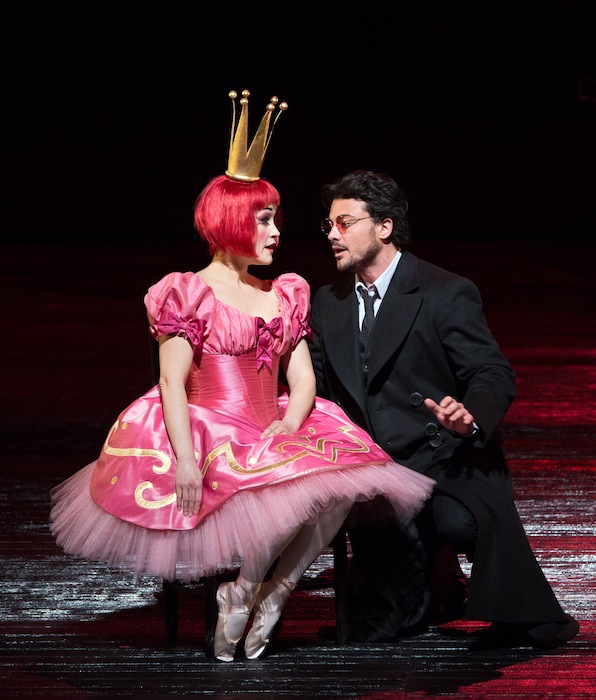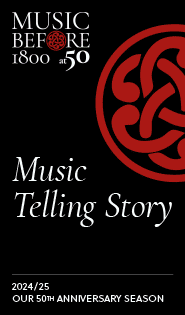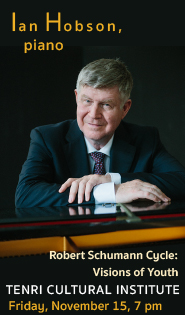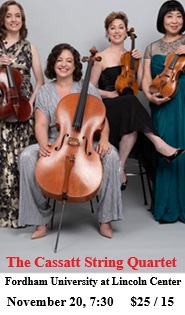Met gets new season on track with a worthy, well-sung “Hoffmann”

Erin Morley and Vittorio Grigolo in Offenbach’s “Les Contes d’Hoffmann” at the Metropolitan Opera. Photo: Marty Sohl
After a rocky opening night with Bellini’s Norma, the Metropolitan Opera got its season on track Tuesday with a worthy revival of Les Contes d’Hoffmann. It might not have been the most emotionally charged night at the house, but this well-founded performance of Offenbach’s fantastical odyssey proved as reliably entertaining as anything in the repertoire.
Bartlett Sher’s peculiar production has taken its knocks since its 2009 premiere, yet in its daft way it drives towards the heart of the piece. The zany carnival of Spalanzani’s scientific exhibition, the gothic silhouette of Dr. Miracle’s coach, and the trance-like rapture of Giulietta’s brothel all lend a surreal quality to Hoffmann’s fantastic tales.
For this fall’s run, Vittorio Grigolo reprises the title role, which he last played in 2015, and he seems to have–dare we say it?–matured somewhat as the gloomy poet who guides his listeners through the tales of his lost loves. Noted for his manic approach to every role he tries, in his latest crack at the role of Hoffmann, Grigolo seemed almost reserved by his standards, allowing something other than feverish obsession to come through in his character. Taking his foot off the gas just a touch, he suddenly found space for softer emotions, tender love, keen regret. This no doubt had something to do with vocal characterization–his usually blazing golden tenor sounded more mellow in Tuesday’s premiere, still showing plenty of body, color, and volume — never in danger of getting lost, but not reflecting off the balcony facing, either.
Also returning from the 2015 cast is Erin Morley, whose portrayal of the kewpie automaton Olympia, Hoffmann’s first love, has lost none of its brilliance. Indeed, this interpretation has grown only more charming since two years ago. Her blazing high notes, dart-like staccatos, rippling trills, and flowing arpeggios lit up the house. There isn’t exactly a lot of room for nuance of character here, but to make the goofy ornamentations of the second verse of the “Doll Song” more than showy glitz, as Morley did, is a special trick. Olympia’s mechanical physicality is worth a few chuckles on its own, but all of Morley’s ornaments fit perfectly into a vocal characterization that was hysterically funny in its own right.
Anita Hartig, singing Antonia and Stella in this run, hasn’t yet achieved as high a profile at the Met as she deserves, but since her debut in 2014 she has been among the most consistently compelling lyric sopranos in the Met’s regular rotation. Oddly enough, she seemed unsure of herself in her lovely entrance aria, “Elle a fui, la tourterelle,” narrowing and lightening her voice to the point that it couldn’t quite support the spacious lines. In the rest of the scene, though, she brought her full, ravishing tone, clear and penetrating on top, with caramel in the middle. Fully invested in her role, Hartig was a dreaming ingenue right until her final, tragic moments.
The Irish mezzo Tara Erraught made a strong company debut as Hoffmann’s companion Nicklausse, largely on the strength of her dramatic performance. Sher’s Nicklausse plays the long game—as the alter ego of Hoffmann’s poetic muse, it is his ultimate wish to see his friend return to his writing desk, and so in this production he is complicit in every one of the villains’ treacheries. That can be a tough line to take without become an outright antagonist, but Erraught’s cheeky Nicklausse has no trouble winning the audience’s affection. Her hard-edged mezzo didn’t sit well in the role’s lyrical material, but she showed lively spark in all of her singing nonetheless.
Laurent Naouri was superb as Hoffmann’s four nemeses, his rich, viscous bass-baritone giving the roles a delicious molasses color. Though his singing was a little too straight in Act III’s interpolated “Scintille, diamant,” his overall portrayal was marvelously malevolent: his moustache seemed to twirl itself. As the four servants, tenor Christophe Mortagne showed real comic genius, especially in his appearance as Frantz, Antonia’s hapless housekeeper.
In the Met’s edition of the score (a highly traditional version originally prepared by James Levine), Hoffmann’s third lover, Giulietta, has little chance to shine outside of the Barcarolle at the top of her act, but Oksana Volkova made the most of the role with her firm, dark soprano. Robert Pomakov showed a solid, rough-grained bass as Antonia’s father Crespel and the innkeeper Luther. Mark Schowalter blared pompously as Nathanaël and Spalanzani, and David Crawford showed off a thunderous bass-baritone as Hermann and Schlémil.
The score of Hoffmann is, much like the story itself, a cabinet of curiosities, and the great strength of Johannes Debus’s reading was that he found and amplified the native charm of every episode: brashness, coyness, sumptuousness, absurdity, and horror all sounded equally vivid under his baton. The Met Orchestra gleamed, as ever, and Donald Palumbo’s chorus was in superb voice all night long, whether in the raucous roar of the drinking songs or in the sublime hush of the Act III septet.


